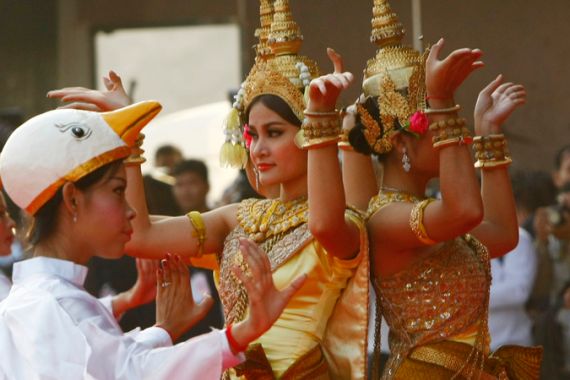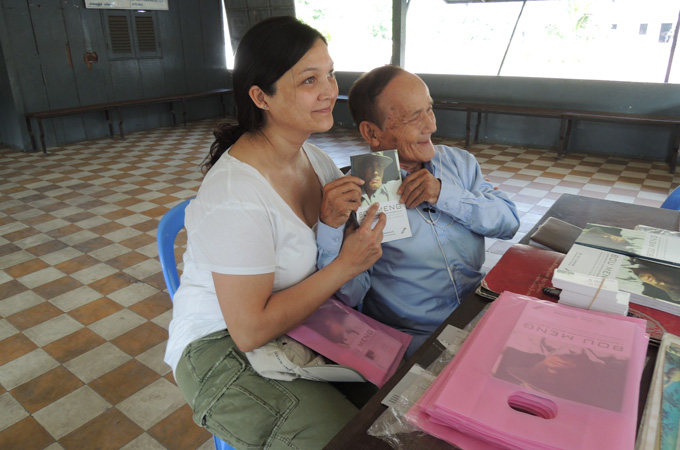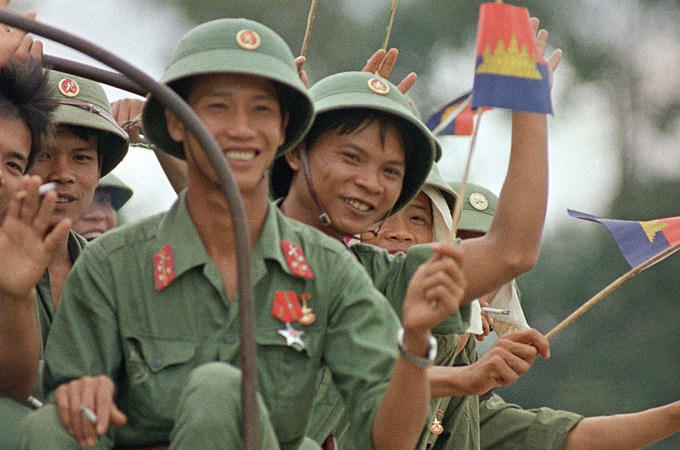Cambodians remember the ‘Killing Fields’
Victory Day marks the January 7, 1979, liberation by Vietnamese forces, but not all are happy.

Phnom Penh, Cambodia – For Bou Meng and Chum Mey, the label “survivor” gives only a hint of their harrowing ordeals.
Thirty-five years ago, both walked free from a prison in Cambodia’s capital, where an estimated 14,000 adults and children were interrogated, tortured and sent for execution at mass gravesites. Bou Meng and Chum Mey were among only a handful of people to survive Pol Pot’s infamous S-21 interrogation centre.
On January 7, 1979, Vietnamese troops supporting a small contingent of Cambodian soldiers entered Phnom Penh and toppled the Khmer Rouge regime, sending Pol Pot and his henchmen fleeing to the jungles on the Thai border, and ending a nightmare that had lasted more than three years and cost the lives of some 1.7 million people.
”It
– it was an invasion… It is the fall of the Khmer Rouge, but it is also like escaping from the tiger into the mouth of the crocodile.”]
About 20,000 Cambodians attended an event in Phnom Penh on Tuesday to celebrate the anniversary: an occasion carefully staged to emphasise the role of Prime Minister Hun Sen’s ruling Cambodian People’s Party (CPP) in the liberation of the country from the Khmer Rouge, and the debt the country still owes his long-ruling party for putting an end to the murderous regime.
The January 7 celebration, however, is one of the most contentious events on the Cambodian calendar.
While members of Hun Sen’s party venerate they day they came to power, opponents of the CPP say January 7 marks the first day of an invasion and 10-year occupation by Cambodia’s historic enemy, Vietnam.
The controversy has not spared Bou Meng, 73, and Chum Mey, 84, two people who owe more than most to the invaders.
“It was not a ‘saving’ [of Cambodia] – it was an invasion,” said Bou Meng.
‘Mouth of the crocodile’
He spent two years inside the Khmer Rouge torture centre and was only spared execution because his artistic talents were put to work producing hand-painted portraits of Pol Pot. Bou Meng’s wife did not survive. She was taken to S-21 and later killed at the execution site and mass graves, known as Choeung Ek, on the outskirts of Phnom Penh.
“January 7th was the beginning of Vietnam’s influence over Cambodia,” said Bou Meng, who spends his days selling copies of his prison memoir inside the grounds of the notorious S-21 camp, now a museum dedicated to preserving evidence of the atrocities of the Pol Pot regime.
 |
| Khmer Rouge survivor Bou Meng poses with a visitor at the former S-21 prison [Kevin Doyle/Al Jazeera] |
Even though he owes his survival to Vietnamese troops, Bou Meng said that doesn’t mean he owes them anything today.
“It is the fall of the Khmer Rouge, but it is also like escaping from the tiger into the mouth of the crocodile,” he said.
Vietnamese troops and civilian and political advisers stayed on a further ten years to fight Khmer Rouge guerrillas and administer much of Cambodia, as well as establish in power the earliest incarnation of Hun Sen’s government. That extended stay deepened the resentment of many Cambodians towards their country’s “liberator”.
Bou Meng, like many, said he believes the close links between the CPP and Vietnam have never been sundered, a view that has not endeared him to the administrators of the government-run museum – where he is much like a living exhibit.
“I don’t believe they [the Vietnamese] all went back,” Bou Meng said in an interview outside S-21. He is prohibited from speaking to journalists inside the “Museum of Genocide” because his views are clearly not pro-government.
 |
| Vietnamese troops on their way back home as they leave Cambodia in September 1989 [AP] |
“They [the Vietnamese] just took off their military uniforms and put on shirts and became Cambodians,” he said.
A police officer stationed at the museum politely explained it was advised to speak with the second prison camp survivor, Chum Mey, who was sitting only a few metres away selling copies of his own memoir to tourists.
Chum Mey, author of Survivor, is a supporter of Hun Sen’s government, and his views on January 7 and the Vietnamese intervention are diametrically opposed to Bou Meng’s.
“If the Vietnamese troops did not enter the country, all the Cambodian people would have been killed, they would have been smashed, because they accused us of being in the CIA [US Central Intelligence Agency],” Chum Mey said. “Don’t forget, Pol Pot didn’t allow us to speak, didn’t allow us to see, didn’t allow us to hear,” he said.
“I would like to thank the Front [Cambodian leadership in 1979] and the Vietnamese army who came to liberate us. If they had not intervened, I would not have survived. I cannot forget this. If there is no January 7th, there is no today.”
Thorny relations
Justice for the crimes of the Khmer Rouge has been slow going. To date, only the commander of the S-21 prison, Kaing Guek Eav, has been prosecuted for crimes perpetrated on behalf of the regime and will spend life in prison.
Four other senior regime leaders were arrested by the UN-backed Khmer Rouge war crimes tribunal, but the regime’s former foreign minister Ieng Sary died last year and his wife, former minister of social action Ieng Thirith, had charges against her dropped because of advanced dementia.
The trials of Pol Pot’s number two, Nuon Chea, and former head of state Khieu Samphan are ongoing, with verdicts expected this year in the first phase of their prosecution.
Cambodians and their thorny relationship with Vietnam has come to the fore in recent months as the Cambodia National Rescue Party (CNRP), which chalked up the largest opposition win in July national elections in more than 15 years against Hun Sen’s party, campaigned vigorously on an anti-Vietnamese platform.
Everybody uses January 7 for political purposes. Cambodian people want real democracy right now, but the government is killing democracy.
Both CNRP leader Sam Rainsy and his deputy, Kem Sokha regularly peppered their pre-election speeches with warnings of the “youn” – a term considered derogatory to describe Vietnamese – stealing Cambodian territory, entering the country unchecked to live and work, as well as Hun Sen’s alleged continued indebtedness to Vietnam for first placing him in power.
In a worrying deterioration, members of the government’s security forces – who have participated in the recent brutal repression of anti-Hun Sen protests and striking garment factory workers – are now being described by members of the public as Vietnamese spies dressed in Cambodian uniforms.
Researcher Kem Ley said Cambodian history had been politicised for too long, and both the ruling party and the opposition have used the toppling of Pol Pot for partisan gain, rather than genuine national reflection on the end of a terrible period in Cambodia’s history.
“Both parties are right” in their interpretation of the events 35 years ago, Kem Ley said, adding that both views of the Vietnamese intervention – liberation and invasion – were correct.
“Everybody uses January 7 for political purposes,” he said, adding an independent committee should be established to analyse and report on the disputed anniversary in an impartial and non-partisan manner.
And, much like the need for openness in historical matters, Hun Sen’s government needs to allow greater freedoms in society today, Kem Ley said.
“Cambodian people want real democracy right now, but the government is killing democracy,” he said.
Additional reporting by Van Roeun
Follow Kevin Doyle on Twitter: @doyle_kevin